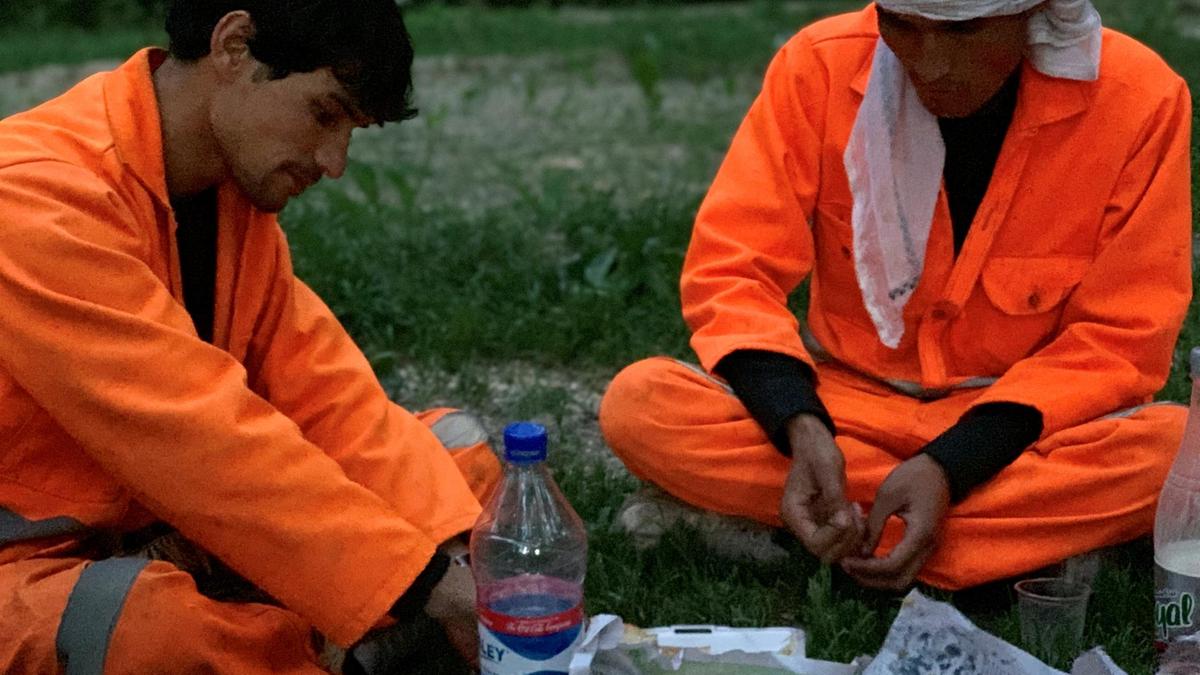The sun was setting over the Afghan capital on the second day of Ramadan, the Muslim month of fasting, prayer and good deeds, but municipality cleaners Zabihullah and Fahim were still out on the streets of Kabul, hours after their shifts had ended.
“The money we make isn’t enough to survive, which is why after work we walk around, so that people will give us something – money, food, bread,” said Zabihullah, 24, who has worked as a city cleaner since he was 15 years old.
I had a lot of big dreams in high school; I wanted to achieve a lot
Fahim, Kabul street cleaner
They earn about 11,000 Afghanis (Dh518) a month and both men are the sole breadwinners in large families that include disabled parents and siblings in need medical care.
As the time approached for iftar, the breaking of the day-long fast, we asked to join in their meal. They guided us to a spot in Sharenaw Park, a small green space in the city centre, where we sat around portions kebabs and Qabili pulao, an Afghan dish of rice and meat cooked with carrots and raisins, and a bottle of dogh, a buttermilk drink.
After a short prayer for themselves, their families and for peace in their country, we broke bread together. Over the course of the simple meal, Zabihullah and Fahim shared their hopes and their views on the future of Afghanistan.
“I had a lot of big dreams in high school; I wanted to achieve a lot. I enrolled for a lot of private courses along with my schooling – computers, English, mathematics – so I could earn a better living,” said Fahim, 25, who has worked for the municipality for five years.
However, nearly two decades of insurgency by the Taliban has taken its toll on the Afghan economy. Forty-two per cent of the working-age population is unemployed, according to the International Labour Organisation. The hardline Islamists, whose regime was toppled by the US-led invasion in 2001, now exert control over almost half of the country and have stepped up their attacks on security forces and government targets.
According to the World Bank, the continued insecurity is curtailing private investment and consumer demand, while agricultural growth has been affected by severe drought in the recent years.
In these circumstances, Fahim and Zabihullah are grateful for their jobs. “The good thing is that it is a steady income and I don’t have to wait for work like the daily wage labourers,” said Zabihullah, as Fahim nodded in agreement.
But in a city that witnesses as much violence as Kabul, being a street cleaner comes with additional challenges. Several times in recent years, Zabihullah and Fahim have been called in to clean up after insurgent attacks – scenes of blood, death and destruction that leave long-term emotional scars.
“About a year ago, I was called to clean up after the ambulance bomb outside the Jhumuriyat Hospital. We were cleaning till 1.30am that night,” said Zabihullah, recalling a Taliban attack in January 2018 that claimed the lives of more than 100 people and injured 235.
“What we saw that night could even break the heart of an infidel, there was so much blood and destruction. I was so disturbed I couldn’t even concentrate on the work I was doing,” he said.
“Whenever I have to go to such places to clean up, I can’t function for the next few days,” said Fahim. “My heart feels heavy all the time, I can’t eat anything for days.”
Read full story on The National UAE
